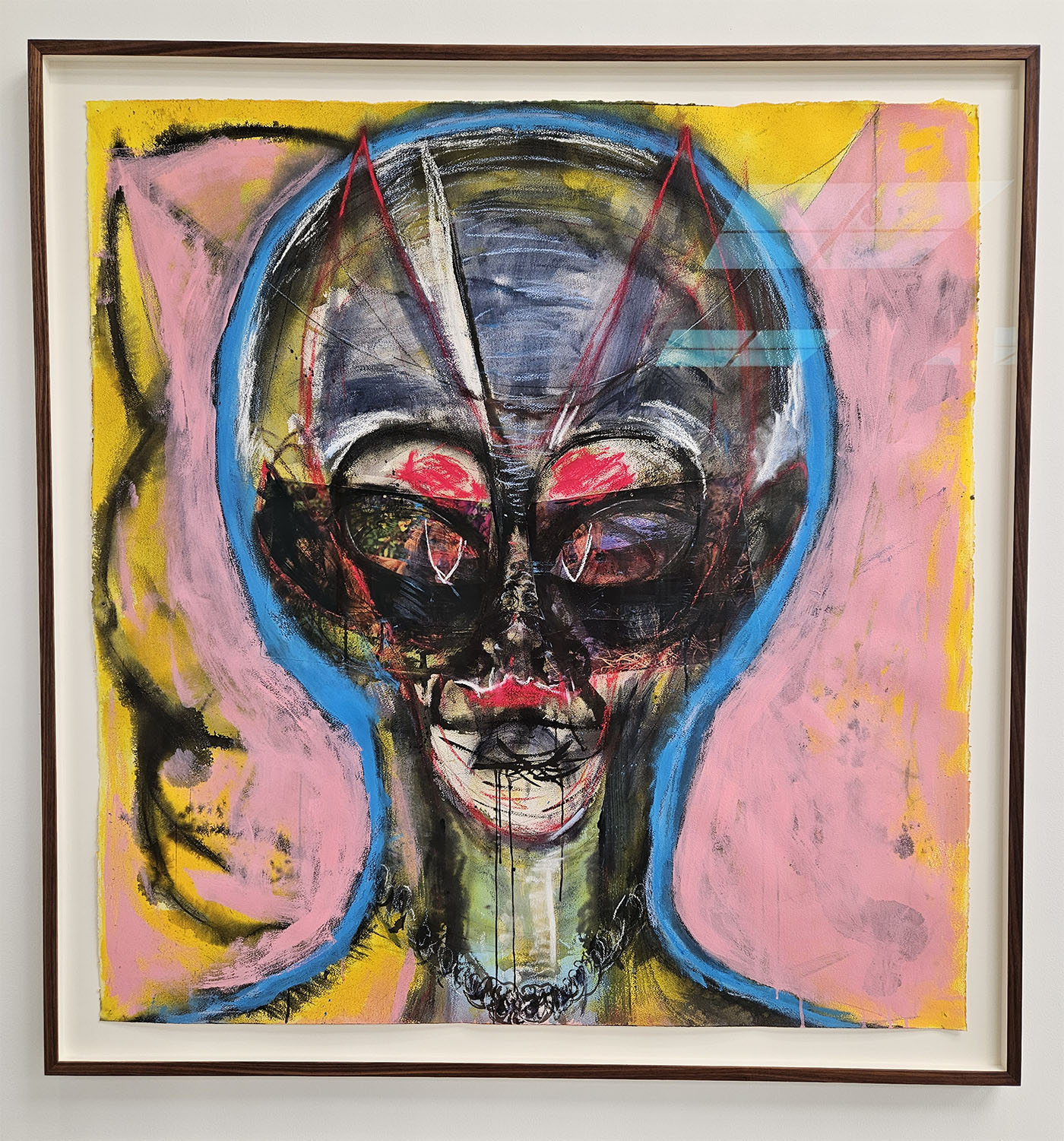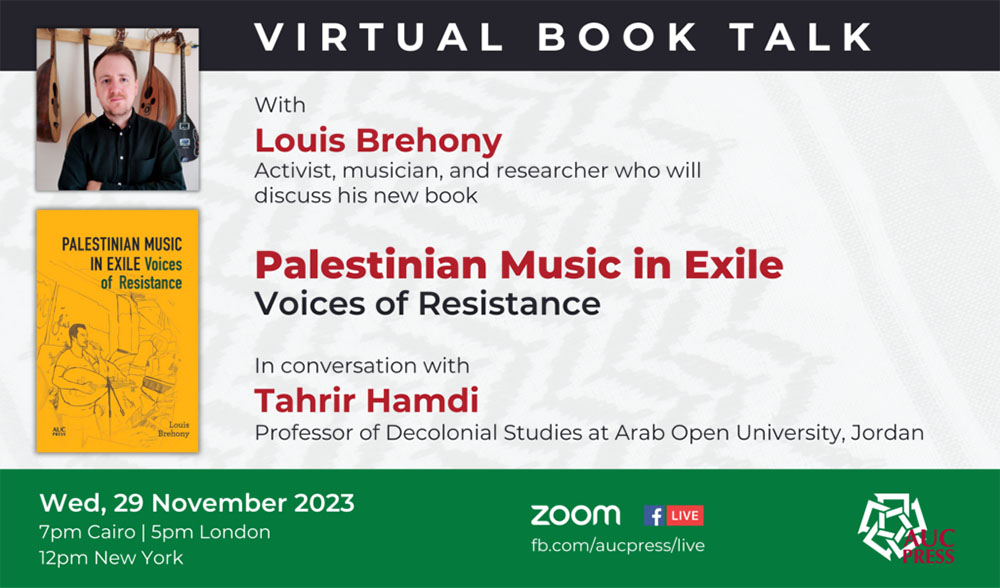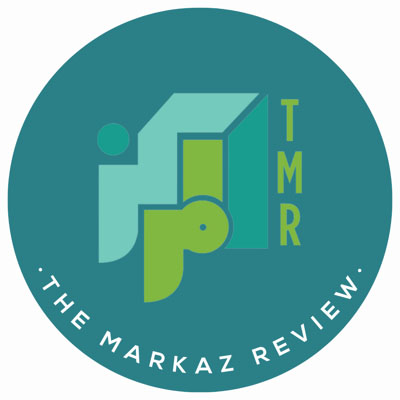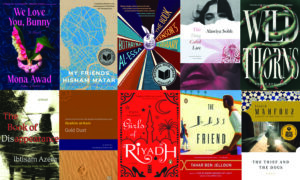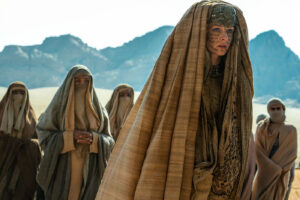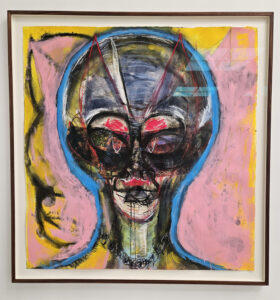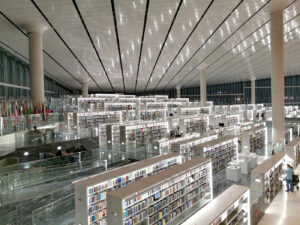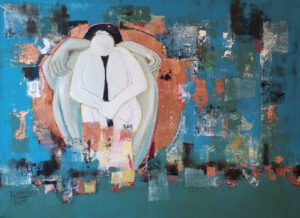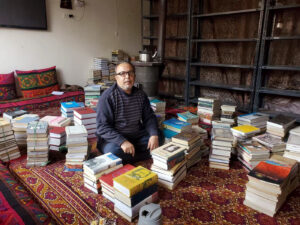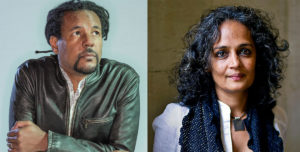TMR World Picks are selected by our editors. Send your suggestions to editor@themarkaz.org
TMR Editors
Huma Bhabha, A Fly Appeared and Disappeared, Nov. 18-Jan 28, 2024, MO.CO, Montpellier
The paintings and sculptures of Huma Bhabha will remind some viewers of the post-nuclear world envisioned by the Alien or Terminator movies, in which deadly aliens and robots dominate humans. A Fly Appeared, and Disappeared is the artist’s first monographic exhibition in a French institution. Her art brings together different eras, materials, and iconic forms that evoke anthropomorphic and hybrid presences, by constantly adding, layering, and cutting materials. The figure is ubiquitous in her work, always suggesting an ambiguous otherness, whether distant or near, ancient or unborn. Bhabha draws on an infinite repertoire of references, borrowing from both the academic world and popular culture, from ancient statuary to science fiction films, insisting on a universalism of forms. Some fifty works are displayed at MO.CO. More info.
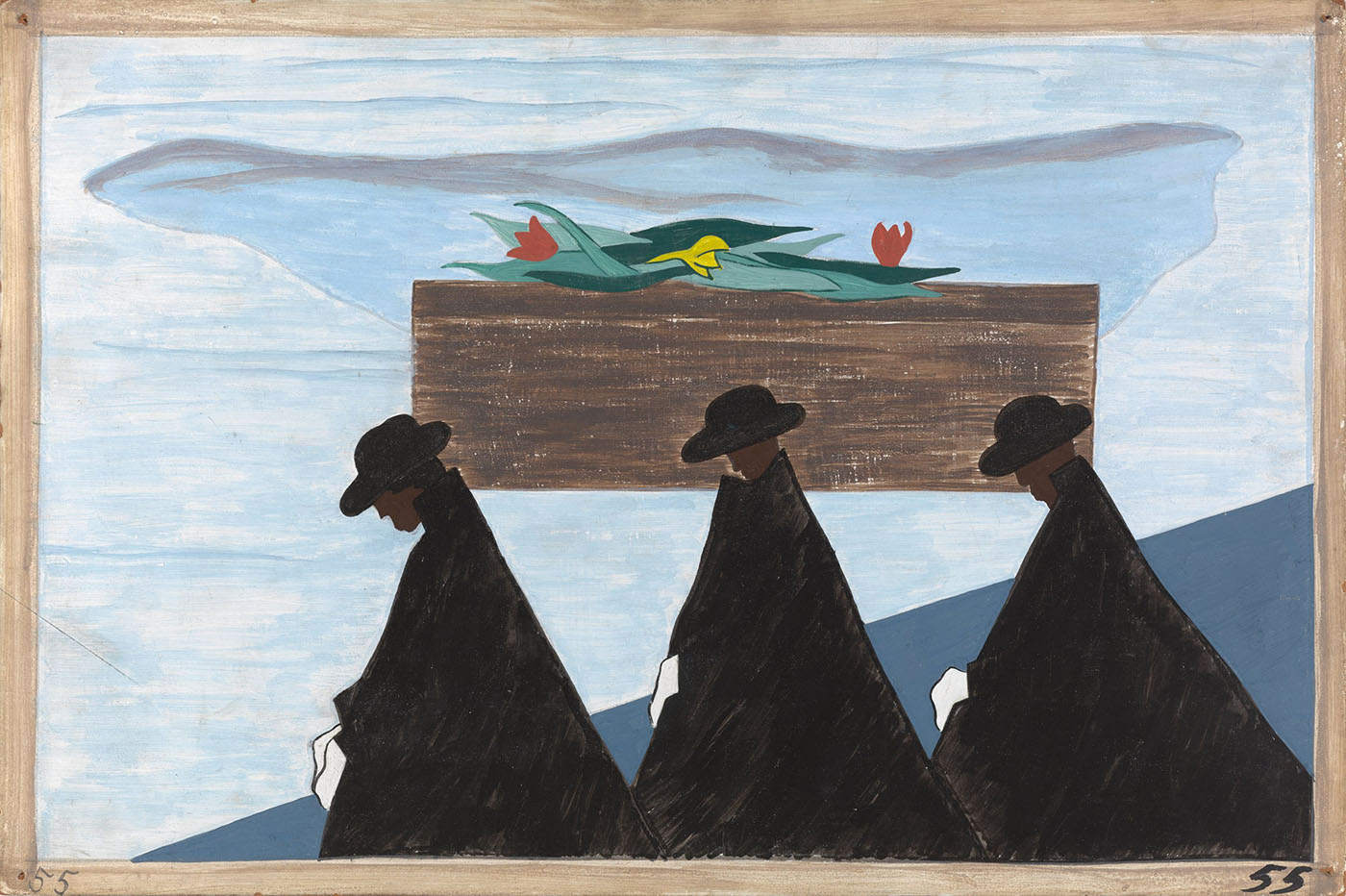
The London Migration Film Festival, London (various locations)
Ongoing — Nov. 29, full program
London Migration Film Festival is an annual film festival that has been running since 2016 that aims to challenge the narrow rhetoric on migration that often sees migration, and people on the move, framed in reductive and dehumanizing terms.
You won’t want to miss the film screening of We Dare to Dream by film director Waad Al-Kateab (Nov.27), who will be present at the event for a Q&A session. The film documents athletes from around the world as they prepare to compete at the Tokyo Olympics. A promising young Iranian taekwondo fighter, a South-Sudanese field runner, a Syrian swimmer and many more — they all share their passion for sports, and the affiliation to the Refugee Olympic Team. This documentary, from the director of critically acclaimed For Sama, observes their lives, their training, and the emotional journey that will bring them to the competition of a lifetime.
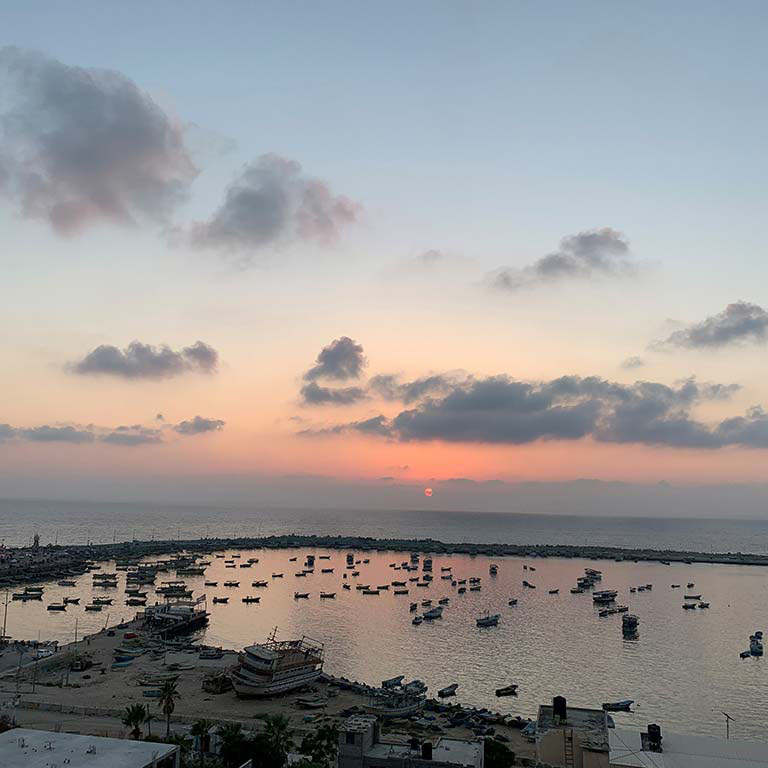
The Bethlehem Cultural Festival, UK (various locations/online)
Nov. 27 — Dec. 9 — full program
Enjoy a celebration of Palestine and the Eastern Mediterranean’s rich and diverse cultural scene through music, theatre, film, cookery, dance, architectural heritage and panel discussions. The festival was launched digitally in December 2020.
This year, the festival has had to scale back its events due to the ongoing situation in Gaza, with much of their programming available for audiences to stream live online. Two timely highlights you don’t want to miss include the moderated discussion, “Reporting Palestine: Understanding how Palestine is represented in the media and inviting alternative approaches” (Nov. 27) which explores how the media is reporting the ongoing violence in Gaza. A panel of experienced journalists and analysts, including Palestinians and others with close knowledge of the region, offer insight on the challenges around reporting in and from Palestine, both in the context of past experiences and new reporting techniques. An audience Q&A will follow the discussion. The panel includes speakers Zena Agha, former US Policy Fellow for the Palestinian policy network Al-Shabaka; Chris Gunness, former chief spokesperson for UNRWA; Hind Hassan, award-winning journalist and correspondent for Vice News; Amjad Iraqi, editor +972 and analyst for Al-Shabaka; Aroub Abdelhaq, correspondent for Al-Arabiya; and others. The moderator is Matthew Teller, journalist and author of the recent acclaimed book Nine Quarters of Jerusalem.
Another not to miss is Gaza Witness: Hearing the people of Gaza in their own words (Nov. 28), an evening of readings, shared experiences and testimonies from those in Gaza and those who know Gaza. Speakers include Ahmed Najar, Palestinian actor and playwright from Gaza; Tasneim Zyada, British-Palestinian actor and spoken word poet; Caitlin Procter, a political anthropologist who teaches at the Migration Policy Centre; Louisa Waugh, journalist and author of Meet Me in Gaza (Saqi Books); and featuring musical performance by composer and concert flautist Wissam Boustany.
Both events will be livestreamed at no charge.
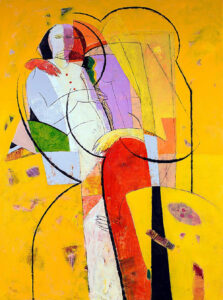
The Sea Of Life: Modern and Contemporary Art from The Kingdom of Bahrain, Middle East Institute Arts and Culture Center, DC
Dec. 1, 2023 — Mar. 26, 2024 more info
Co-curated by Bahrain-based Hayfa Aljishi and MEI Arts and Culture Center Director Lyne Sneige, the exhibition features 14 artists spanning different generations and art forms exploring their connection to their natural and built environment through painting, photography, sculpture, video and installation. The thirty featured artworks offer a glimpse into the legacy of Bahrain’s pioneering artists, the evolving arts scene and the ways in which younger generations are exploring new artistic expressions. Participating artists: Rashid Al Khalifa, Marwa Al Khalifa, Mohammed Al Mahdi, Mariam AlNoaimi, Jaafar Al Oraibi, Abdul Karim Al-Orrayed, Mashael Alsaie, Jamal AlYousif, Nasser AlYousif, Ebrahim Bu Saad, Balqees Fakhro, Aysha Hafuz, Ghada Khunji, Abbas Yousif.
The opening evening on Dec. 1 will also feature an art talk with participating artists Mariam AlNoaimi, Jamal AlYousif, Ghada Khunji and curator Hayfa Aljishi moderated by Lyne Sneige, followed by a tour of the exhibition.
The show is sponsored by the National Arts Council in Bahrain and the RAK Art Foundation.
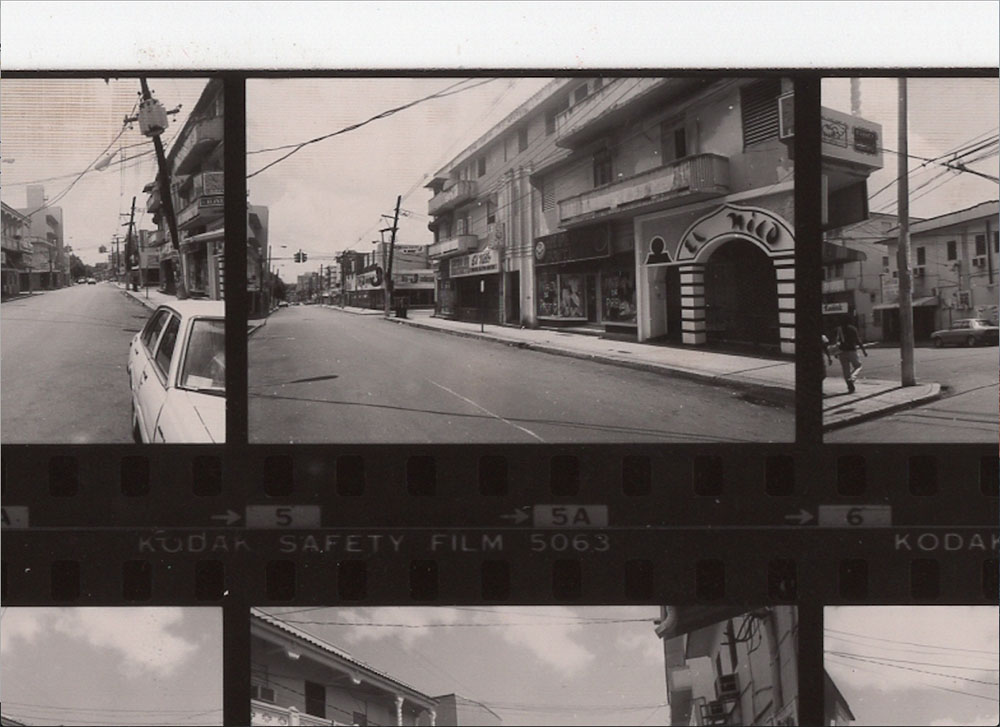
Alia Farid, Elsewhere, December 1-February 4, 2024, London
This will be Kuwaiti-Puerto Rican artist Alia Farid’s first exhibition in the UK. Working in film and sculpture, Farid gives visibility to less commonly recognized histories, often diminished by Western hegemony. Underpinning Farid’s practice is an ongoing research project that maps Arab and South Asian migrations to Latin America and the Caribbean. A growing material archive that traces these movements, and the subsequent adaptations of architectural styles, ornamentation, rituals and other social devices, forms the basis of Farid’s ambitious commission at Chisenhale Gallery. Much like her own heritage, Farid’s exhibition will bring seemingly disparate sites in relation to each other, creating a trans-regionalism that challenges national boundaries. Farid’s new work is a co-commission with The Power Plant, Toronto and CAC Passerelle, Brest.
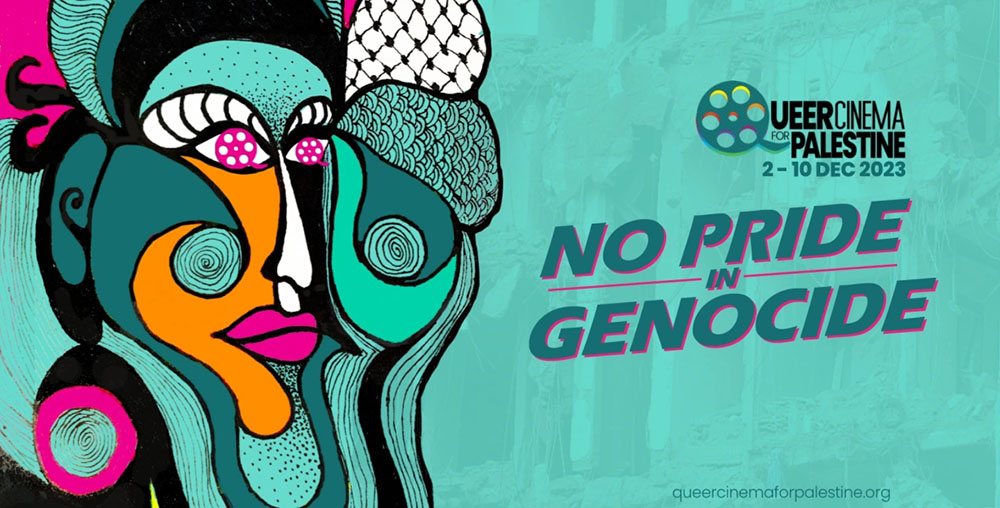
Queer Cinema for Palestine: No Pride in Genocide
Dec. 2 — Dec. 10 full program (various cities)
Queer Cinema for Palestine started as a film festival in 2021 as a solidarity initiative offering artists and arts groups around the world a vibrant space to stand together, using our art to oppose the ongoing violence of Israeli occupation and apartheid against Indigenous Palestinians. In 2023, Queer Cinema for Palestine will host “No Pride in Genocide,” in solidarity with Palestinians in Gaza and across all of historic Palestine and denouncing Israel’s genocidal attacks and ethnic cleansing against millions of Palestinians.
Organized by nearly 40 partner groups around the world and streamed on the Toronto Queer Film Festival website, No Pride in Genocide film programs and Palestinian and allied speakers will echo the call from Palestinians to refuse complicity with Israel’s apartheid regime.
Join for in-person events, as well as free of charge online film screenings that will be available for online viewing on the Toronto Queer Film Festival (TQFF) website starting at the local time of the scheduled screening. Films will remain available for on demand viewing through the end of the festival.
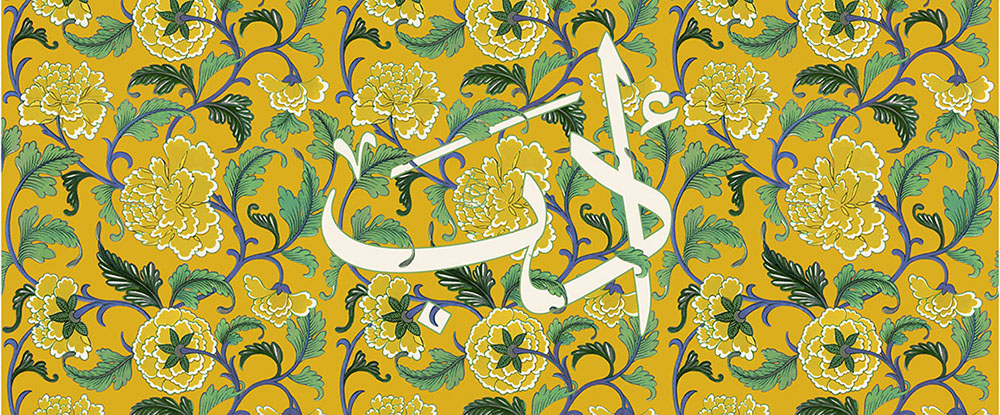
ADAB 2023, France
Dec. 8 — Dec. 9 more info
Adab means literature in Arabic and is written (أدب). The Turkish (edebiyat) and Persian (adabiyat) words for literature are derivatives of adab, symbol of the porosity of languages and traveling words, from the Maghreb to the Middle East.
Adab is a literary festival dedicated to new writings from the Maghreb and the Middle East and to the new generation of writers from the region, while paying tribute to the great writers of recent decades. Since 2011, the Arab world and the Middle East have experienced intense social and political upheavals, which have been expressed through renewed cultural production in the countries of the region but also in the diasporas of Europe. It is these new voices that we will give you to hear for three days at the Maison de la Poésie.
Kicking off the festival will be a talk with authors Adania Shibli and Iman Mersal. The session will be moderated by journalist, translator and independent researcher Colin Houssais and interpreted from Arabic to French by Rouba Hassan. Shibli and Mersal will discuss how language exists not only in words, but also in silence and time and their personal relationship with all three. This is all the more tangible for writers who do not live in their country of origin, but who are immersed in a language other than that of their books. The Egyptian Iman Mersal lives in Canada and the Palestinian Adania Shibli in Germany. Both write in Arabic.
Iman Mersal has written several books and collections of poetry including In the footsteps of Enayat Zayyat and Things Escaped Me. She is Professor of Arabic language and Literature at the University of Alberta, Canada.
Adania Shibli was born in Palestine, completed her doctorate in London and lives in Berlin. She has published three novels in Arabic, including Reflections on a White Wall, We are all Equidistant from Love, and A Minor Detail.
Book Talks
*The Problem of Democracy: America, the Middle East, and the Rise and Fall of an Idea by author Shadi Hamid (Oxford University Press, 2022).
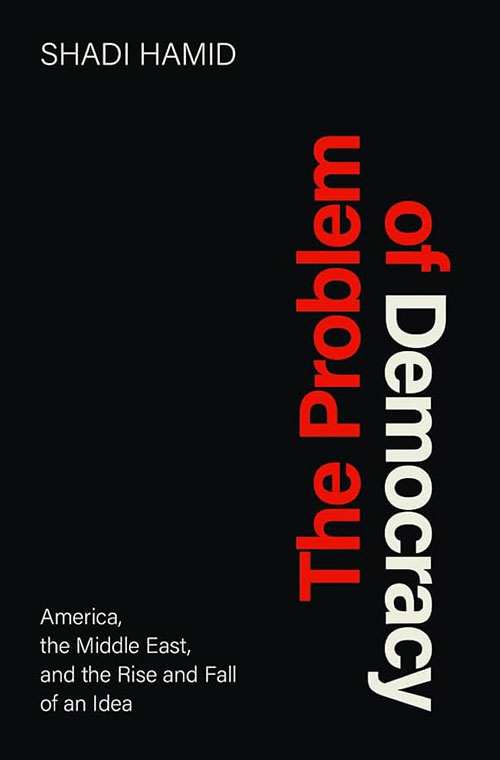
In The Problem of Democracy: America, the Middle East, and the Rise and Fall of an Idea, author Shadi Hamid explores what he describes as the ‘democratic dilemma,’ the U.S. desire for democracy in theory but not in practice. Hamid cites the rise of Islamist parties during a wave of democratic elections across the Middle East, which he argues produced outcomes the U.S. was not intending, such as the empowerment of Hamas in Gaza following the 2006 Palestinian elections.
Reviewing the lessons learned from the past two decades of U.S. policy in the Middle East, Hamid proposes ‘democratic minimalism’ as a new approach to democracy promotion. Instead of viewing democracy as a tool to usher in liberalism, economic development, and cultural progress, Hamid argues that democracy as an end in of itself should be prioritized over other liberal values.
Join the Middle East Institute for an in-person discussion with author Shadi Hamid and Thomas Carothers, Co-Director and Senior Fellow, Democracy, Conflict and Governance Program at the Carnegie Endowment for International Peace, on the strategy of U.S. democracy promotion abroad, the consequences of the democratic push in the early twenty-first century and the future shape of governance systems globally. Gönül Tol, MEI Senior Fellow and Director of the Turkey Program, will moderate the discussion.
The discussion will be followed by a reception and book signing.
Nov. 29 —Virtual | 7pm Cairo | 5pm London | 12pm New York — more info
Join AUC Press for a virtual book discussion of Palestinian Music in Exile: Voices of Resistance with author and activist Louis Brehony, on the occasion of the “International Day of Solidarity with the Palestinian People” and in conversation with Dr. Tahrir Hamdi, Professor of Decolonial Studies at Arab Open University, Jordan.
Palestinian Music in Exile is a historical and contemporary study of Palestinian musicianship in exile in the Middle East, spanning half a century in disparate locations including Gaza, Turkey, Kuwait, and Egypt. Grassroots musicians emerge here as powerful actors, their stories taking center stage, offering critiques of existing conditions, new perspectives on displacement and the transmission of Palestinian narratives, and presenting alternative visions for the future.
Watch the book trailer here.
You can register to attend the event here.



